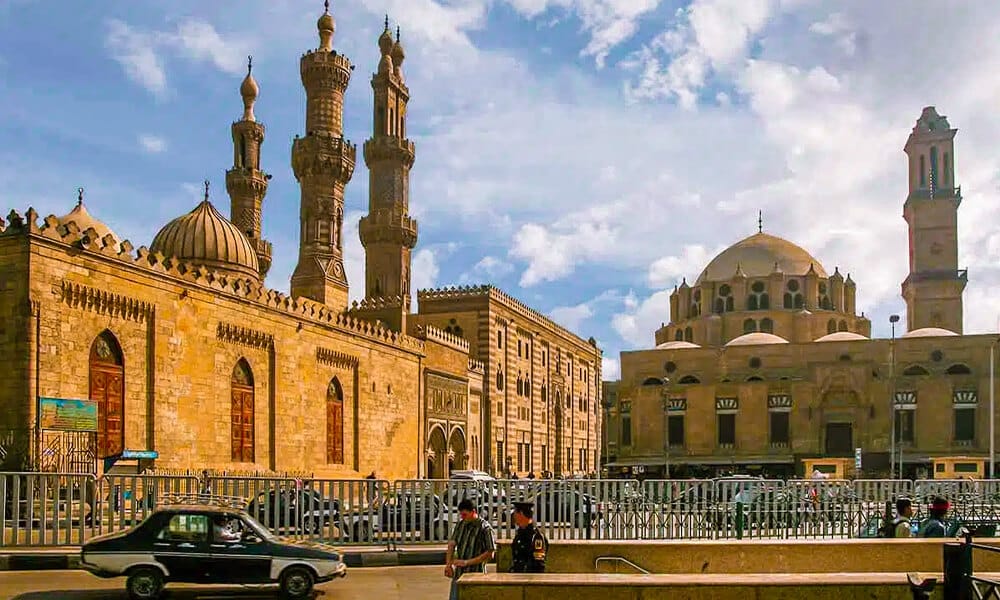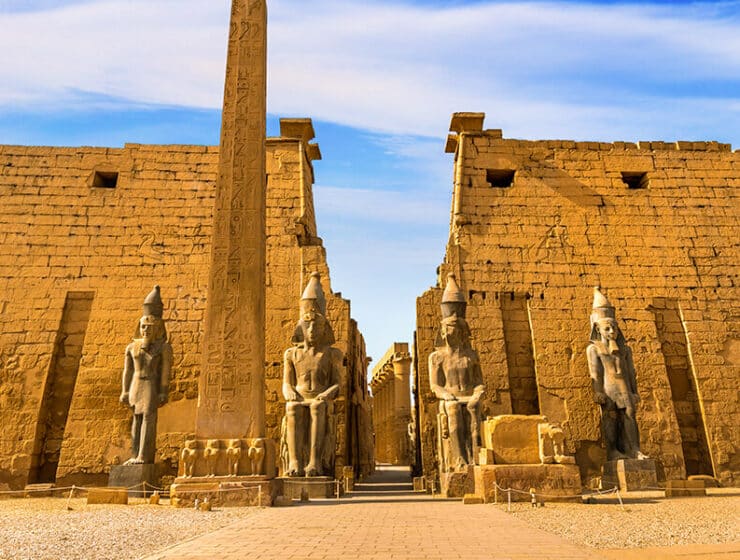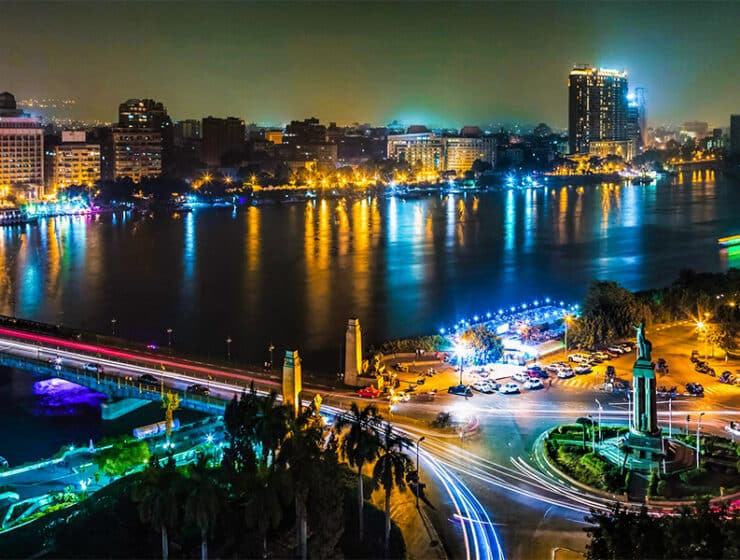Cairo, the vibrant capital of Egypt, boasts an illustrious Islamic heritage that has shaped its identity over centuries. This bustling metropolis is a treasure trove of historical significance, with its winding alleys and towering minarets bearing witness to the rich Islamic culture that thrives here. Cairo’s Islamic heritage encompasses the city’s iconic mosques and a profound legacy of art, architecture, and religious tradition that has left an indelible mark on the region. In this exploration, we will delve into the heart of this heritage, uncovering the stories, artistry, and spiritual depth that define Cairo’s Islamic character and how it continues to captivate the world today.
Discover the charm of Islamic Cairo, a district steeped in history.
The significance of mosques in Islamic culture
Mosques are paramount in Islamic culture, serving as spiritual sanctuaries and communal life centers. These sacred spaces are where Muslims connect with the Divine through prayer and serve as hubs for education, community gatherings, and social welfare. The architecture and design of mosques are not merely aesthetic choices but symbolize the core tenets of Islam. They represent unity, equality, and the eternal connection to God. Throughout history, mosques have been pivotal in preserving Islamic heritage and fostering a sense of belonging among the Muslim community. Exploring the significance of mosques in Islamic culture unveils the profound spiritual and communal role they continue to play, not just in Cairo but across the Islamic world.

Explore our Tours:
- Day Tour To Coptic and Islamic Cairo
- Day Tour To Egyptian Museum and Coptic and Islamic Cairo
- Islamic Cairo Tour To Famous Mosques in Cairo
- Muizz Street and Khan El Khalili Bazaar Tour
Historical overview of Cairo’s mosques
Cairo’s historic journey is intricately interwoven with the evolution of its mosques, which stand as timeless witnesses to the city’s rich and diverse history. The story of Cairo’s mosques is an epic narrative that spans over a thousand years, from the city’s foundation in 969 AD to the present day. It encapsulates the rise and fall of empires, the ebb and flow of artistic and architectural movements, and the enduring strength of religious devotion. Each mosque in Cairo tells a unique tale, reflecting its time’s values, aspirations, and influences. From the austere grandeur of Ibn Tulun Mosque to the exquisite elegance of Al-Azhar Mosque, these sacred sites are living archives of Egypt’s Islamic heritage, offering a captivating historical journey that awaits all who explore the city’s architectural gems.
Shop ’til you drop in the bustling Shopping in Cairo.
Famous mosques in Cairo – Al-Azhar Mosque, Ibn Tulun Mosque, Sultan Hassan Mosque, Muhammad Ali Mosque, Al-Rifa’i Mosque

Cairo boasts an impressive array of famous mosques, each an architectural masterpiece and a testament to the city’s rich Islamic heritage. Al-Azhar Mosque, founded in 970 AD, is a renowned center of learning and one of the world’s oldest universities and stands at the heart of Islamic scholarship. The striking Ibn Tulun Mosque, with its unique spiral minaret, dates back to the ninth century and represents a beautiful example of Islamic architecture. Sultan Hassan Mosque, an awe-inspiring Mamluk-era creation, exudes grandeur with its towering minarets and intricate detailing. The iconic Muhammad Ali Mosque, perched atop the Citadel, offers breathtaking panoramic views of the city and is an emblem of Cairo’s Ottoman history. Lastly, the Al-Rifa’i Mosque’s magnificent domes and ornate interiors reflect a blend of architectural styles and serve as a final resting place for Egypt’s royal family. Together, these famous mosques offer a kaleidoscope of history, art, and spirituality, enriching the cultural tapestry of Cairo.
Explore the historic Al-Azhar Mosque, a symbol of Islamic scholarship.
Architectural features of Cairo’s Islamic buildings
The architectural features of Cairo’s Islamic buildings are a testament to the city’s remarkable history and the evolution of Islamic design. Often characterized by intricate detail and grandeur, these structures showcase a harmonious blend of influences from various Islamic dynasties and periods. Ornate minarets, adorned with intricate geometric patterns and calligraphy, pierce the skyline, calling the faithful to prayer. Arches, domes, and courtyards create a sense of balance and serenity within the architecture. You’ll discover exquisite tilework, stucco ornamentation, and decorative elements that convey religious symbolism and spiritual depth. Cairo’s Islamic buildings are not just physical structures but living expressions of a cultural and religious heritage that continues to captivate and inspire admirers of art and architecture worldwide.
Experience A Day in the Ancient City of Luxor.
Preservation and restoration efforts for Cairo’s Islamic architecture
Preservation and restoration efforts for Cairo’s Islamic architecture are essential in safeguarding the city’s invaluable cultural and historical treasures. As time and urbanization have taken their toll on these ancient structures, concerted initiatives have arisen to protect and restore them. Government agencies, in collaboration with heritage organizations, have taken measures to preserve the architectural integrity of these buildings, often utilizing traditional construction techniques and materials to maintain authenticity. These efforts involve meticulous restoration of intricate tilework, stucco ornamentation, and intricate calligraphy, ensuring that the buildings retain their aesthetic and historical value. The ultimate goal is to maintain these monuments’ structural stability and keep their unique stories alive for future generations, allowing Cairo’s Islamic architecture to continue as a living testament to the city’s vibrant past.

Visit the historic Ibn Tulun Mosque, one of the oldest in Cairo.
Exploring Islamic art and design in Cairo
Exploring Islamic art and design in Cairo is a captivating journey into the world of visual and decorative excellence. Cairo’s art and design draw inspiration from a long and storied history enriched by Islamic culture, and it resonates through its intricate patterns, vibrant colors, and symbolism. Islamic art in Cairo can be discovered in the mesmerizing geometrical designs adorning the walls of mosques, the delicate arabesque motifs carved into wood and stone, and the brilliant hues that paint the stained glass windows. These artistic expressions celebrate the beauty of form and function and often carry deep spiritual significance. Whether through the delicate filigree work of lanterns or the graceful arches of buildings, Cairo’s Islamic art and design encapsulate the essence of a rich, spiritual culture that continues to enchant and inspire all who wander its bustling streets.
Islamic Heritage Tourism in Cairo
Islamic heritage tourism in Cairo offers visitors a unique opportunity to explore a world steeped in history, spirituality, and culture. With its abundance of mosques, monuments, and museums, the city is a veritable treasure trove for those seeking to delve into the Islamic heritage. Tourists can experience the grandeur of architectural wonders like the Sultan Hassan Mosque and the serene beauty of Al-Azhar Park, a hidden oasis amidst the bustling city. They can also visit the informative Islamic art and history museums, which offer insights into the evolution of Cairo’s Islamic culture. Cairo provides opportunities for those seeking spiritual enlightenment to attend prayers at revered mosques and immerse themselves in the age-old traditions. Islamic heritage tourism in Cairo is not just a sightseeing journey but a cultural and spiritual pilgrimage that connects travelers with the heart of Islamic civilization.

Tips for visiting mosques in Cairo
Visiting mosques in Cairo is a rewarding and culturally enriching experience, but being respectful and mindful of local customs and traditions is essential. Here are some tips to ensure a meaningful and respectful visit:
- Dress modestly: When entering a mosque, men and women should dress conservatively. This means covering your shoulders, knees, and hair for women. It’s a sign of respect for the religious environment.
- Remove your shoes: Before entering a mosque, permanently remove your shoes. There are designated areas for this purpose, and it’s a sign of respect and cleanliness.
- Respect prayer times: Mosques have specific prayer times during the day. Check the schedule and plan your visit outside these times to avoid interrupting worshippers.
- Quiet and respectful behavior: When inside the mosque, maintain a calm and respectful demeanor. Avoid loud talking, and turn off your mobile phone or switch it to silent mode.
- No physical contact: Be aware that public displays of affection, such as holding hands or hugging, are generally inappropriate inside the mosque.
- Ask for permission: If you want to take photos inside the mosque, always ask for permission from the caretakers or officials. Some areas may be off-limits for photography.
- Follow guidance: Listen to any instructions or advice given by mosque staff or tour guides. They can provide valuable information and ensure a smooth visit.
- Donations: Consider making a small donation to the mosque if it’s a common practice. This helps support the maintenance and preservation of these historical sites.
- Learn about the mosque: Before your visit, take some time to learn about the history and significance of the mosque you’re visiting. This will enhance your appreciation of the experience.
- Be aware of special rules: Some mosques may have additional limitations or restrictions, so it’s a good idea to inquire beforehand or check for posted signs.
By following these tips, you can make the most of your visit to Cairo’s mosques while respecting the sacred nature of these places.
Festivals Celebrating Cairo’s Islamic Heritage
Cairo’s Islamic heritage comes to life during various festivals and celebrations, providing a unique insight into the city’s rich cultural and religious traditions. Among the most notable is the Mawlid al-Nabi, celebrating the birthday of the Prophet Muhammad. This joyous occasion is marked with colorful processions, poetry readings, and community feasts, offering a glimpse into Egypt’s spiritual heritage.
Another significant festival is Ramadan, a month of fasting and spiritual reflection. In Cairo, this is a time of vibrant street decorations, bustling night markets, and the mesmerizing sound of the call to prayer filling the air. The evenings come alive with communal prayers and family gatherings, creating a profound sense of unity and devotion.
Eid al-Fitr follows Ramadan, a time of feasting, gift-giving, and visiting friends and family. The city is adorned with lights, and the celebratory atmosphere is infectious.
Additionally, Moulid al-Hussein honors the grandson of the Prophet Muhammad and draws visitors to the historic district of Khan el-Khalili, where Sufi music, performances, and spiritual celebrations take center stage.
Each festival offers a unique opportunity to experience the vibrant tapestry of Islamic heritage in Cairo, making the city an even more captivating destination for travelers seeking cultural immersion and spiritual enrichment.
Conclusion
In conclusion, Cairo’s Islamic heritage is a profound tapestry that weaves the threads of history, spirituality, and artistry, creating a city like no other. Its mosques, each with a unique story and architectural beauty, are silent witnesses to centuries of cultural evolution. Visitors to Cairo can journey through time, exploring the intricate designs, radiant colors, and spiritual depth of Islamic art and design that adorn the city’s streets and buildings.
Preservation efforts are underway to safeguard these architectural treasures, ensuring they remain a source of inspiration for future generations. Islamic heritage tourism in Cairo offers a chance to immerse oneself in the heart of Islamic civilization, fostering a deeper understanding of the culture and traditions that define the city.
As you explore the famous mosques, immerse yourself in Cairo’s festivals, and learn the etiquette of visiting these sacred sites, you’ll discover a city that blends the old and the new, the spiritual and the worldly. Cairo’s Islamic heritage is a testament to the enduring power of culture and faith, inviting travelers to embark on a journey transcending time and place, leaving an indelible mark on the soul.





